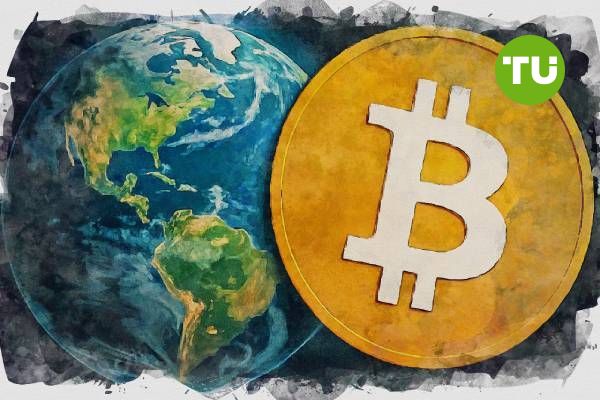Hyperbitcoinization: BTC power to reshape the global economy
 How BTC could transform the global economy
How BTC could transform the global economy
Hyperbitcoinization no longer seems like a fantasy. According to Blockstream CEO Adam Back, Bitcoin’s market capitalization could reach $100–200 trillion within the next decade. Major corporations have already begun preparing for this future by actively increasing their Bitcoin reserves. Everything points to Bitcoin soon becoming an integral part of the global financial system.
What is hyperbitcoinization?
The idea of hyperbitcoinization first began to take shape within the crypto community in 2014. Its essence is simple: once people en masse recognize Bitcoin’s advantages over fiat currencies, the transition to a new monetary standard will become rapid and irreversible. Just as hyperinflation can destroy trust in a currency within months, hyperbitcoinization could transform the global economy for the better within just a few years.
Adam Back believes we are already witnessing the early signs of this process: the number of Bitcoin wallets holding more than 1 BTC continues to grow steadily, institutional players are expanding their reserves, and Bitcoin’s limited supply is making it an increasingly scarce and valuable asset.
Loading...
The first stage: Growing demand and limited supply
One of the key drivers of hyperbitcoinization is the growing imbalance between Bitcoin’s supply and demand. According to Glassnode, back in 2023, the number of wallets holding at least 1 BTC surpassed one million. By 2025, this figure continues to rise, despite market corrections.
Strategy has demonstrated that a long-term Bitcoin accumulation strategy yields impressive results: in 2025, the company's unrealized profit from BTC holdings exceeded $5.1 billion. Following their example, Metaplanet, a Japanese public holding company, also began acquiring Bitcoin as a strategic reserve. Dozens of other major corporations have adopted similar strategies.
Against the backdrop of a shrinking supply — driven by both the permanent loss of some coins and active accumulation — acquiring a whole Bitcoin is becoming increasingly difficult. The trend clearly suggests that owning even one BTC in the future will be considered a significant financial achievement.
How the world’s economic model is changing
Hyperbitcoinization has the potential to fundamentally reshape our understanding of money, savings, and investments. Instead of an inflationary model, where money inevitably loses its value over time, Bitcoin offers a deflationary paradigm: limited supply, growing purchasing power, and no need to rescue capital through risky investments.
Today, assets like gold, real estate, bonds, and stocks are primarily used as stores of value. However, under hyperbitcoinization, their role will change. Hard money will eliminate the need to seek alternative vehicles to protect against currency devaluation.
Financial crises fueled by bubbles of cheap credit will disappear alongside manipulations of the money supply. The economy will return to a more organic, natural cycle of growth without artificially inflated booms and painful busts.
Obstacles along the way
Nevertheless, the path to hyperbitcoinization will not be easy. Government institutions, heavily reliant on inflationary financing models, are unlikely to relinquish their power willingly. Even today, we are witnessing increased regulatory pressure on the cryptocurrency sector across different countries. As Bitcoin continues to strengthen, such attacks are likely to intensify.
Loading...
Asset confiscations, restrictions on cryptocurrency circulation, unfair taxation, and intensified financial surveillance are all possible. Those who aim to preserve their freedom in the emerging financial order will not only need to invest in Bitcoin but also learn how to secure their privacy and protect their digital assets.
The world after hyperbitcoinization
If Adam Back’s predictions come true, we are heading toward a world where the U.S. dollar and other fiat currencies will become mere historical footnotes. Global trade will simplify, currency speculation will vanish, and saving money will once again make sense.
Budget deficits, previously fueled by money printing, will no longer be able to support bloated government spending. The economy will revolve around savings rather than debt, and people will return to planning their lives over decades rather than from one payment cycle to the next.
Conclusion
Hyperbitcoinization has already begun. Its pace may vary, and the path will be fraught with obstacles, but the direction is set. Every day, Bitcoin is strengthening its role as a global store of value.
Right now, the foundations of a new economic order are being laid — one where owning BTC will not just be an investment, but a cornerstone of personal financial security. Those who understand this today will be among the ones shaping the rules of tomorrow’s world.













































































































































